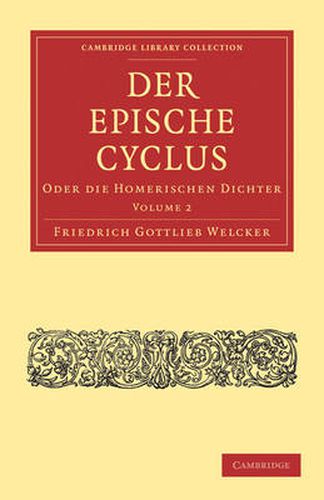Readings Newsletter
Become a Readings Member to make your shopping experience even easier.
Sign in or sign up for free!
You’re not far away from qualifying for FREE standard shipping within Australia
You’ve qualified for FREE standard shipping within Australia
The cart is loading…






Friedrich Gottlieb Welcker (1784-1868) was one of the most engaging and creative of German philologists during the formative period of modern classical scholarship; ‘one of the heroes’, Wilamowitz called him. Art, poetry and religion were to him all the same object of study, and a key to the world of Greek imagination and feeling. His attempt to grasp the meaning of all Greek mythology gave impetus to a still vigorous tradition. This work (in two volumes, first published 1835 and 1849) is his effort to recover the lost epics of the archaic period, and the conditions of their performance and transmission. If his adventurous reconstructions, here and in his companion work on Greek tragedy, do not always command assent, they offer many brilliant observations and insights. His influence has been as diffuse as it is unacknowledged; again and again one finds on reading him that Welcker said it first.
$9.00 standard shipping within Australia
FREE standard shipping within Australia for orders over $100.00
Express & International shipping calculated at checkout
Friedrich Gottlieb Welcker (1784-1868) was one of the most engaging and creative of German philologists during the formative period of modern classical scholarship; ‘one of the heroes’, Wilamowitz called him. Art, poetry and religion were to him all the same object of study, and a key to the world of Greek imagination and feeling. His attempt to grasp the meaning of all Greek mythology gave impetus to a still vigorous tradition. This work (in two volumes, first published 1835 and 1849) is his effort to recover the lost epics of the archaic period, and the conditions of their performance and transmission. If his adventurous reconstructions, here and in his companion work on Greek tragedy, do not always command assent, they offer many brilliant observations and insights. His influence has been as diffuse as it is unacknowledged; again and again one finds on reading him that Welcker said it first.